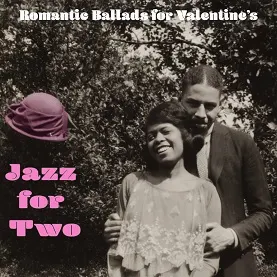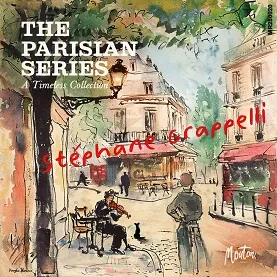Styles: Traditional Jazz, Swing, Big Band
Year: 2019
Time: 65:18
File: MP3 @ 320K/s
Size: 151,6 MB
Art: Front
(4:26) 1. Whispering (opening theme) Song of India
(3:47) 2. Swanee River
(2:05) 3. Almost Like Being in Love
(4:28) 4. I Know Why (And So Do You)
(2:48) 5. Sun Valley Jump
(3:29) 6. Moon Ray
(4:02) 7. Moonlight in Vermont
(2:59) 8. Hot-Cha Cha-Cha
(3:25) 9. American Patrol
(2:58) 10. All the Things You Are
(2:45) 11. L-O-V-E
(2:53) 12. Tuxedo Junction
(3:40) 13. Just The Way You Look Tonight
(2:53) 14. East-Side, West-Side (The Sidewalks of New York)
(2:35) 15. Fly Me To the Moon
(3:42) 16. Boogie Blues
(4:21) 17. Moon River
(3:38) 18. Mack the Knife
(3:30) 19. It Had to Be You
(0:44) 20. The Abletones Jive (closing theme)
Picture this: You’re eating dinner in a crowded ballroom surrounded by couples all dressed to the nines. The stage is set. Big Band stand fronts, vintage instruments and derby mutes line the back row. The lights come up, and eighteen musicians, clad in matching tuxedos, blue vests and pocket squares enter from the wings, their highly polished shoes shining as they take the stage. The bandleader, in his white dinner jacket and spats counts off the first number as the vocalist in her shimmering ball gown appears just in time for her entrance. I’m sure you’re picturing a nightclub or a dance hall circa 1939 but no. It’s a wintry evening in 2018 at Mechanics Hall in Worcester, MA and Dan Gabel and The Abletones are doing what they do best transporting their audience back in time with the sights and sounds of the Big Band era.
In mid-January (2018) we had a busy week playing a series of one-nighters from Boston to Long Island. Our last gig of the week was at Mechanics Hall in Worcester for their annual Winter Soiree. Everything seemed to come together perfectly: the band was hot, the hall was aglow, and the dance floor was packed all night. Fortunately for us, Hannah Truckenbrod joined us for this show. Fortunately for you, this memorable evening was recorded!
I am thrilled to present this album of live recordings. No edits were made, nor any post-production processing used. What you hear on the record is what we performed that night thanks to the expertise of recording engineer Mr. Joe Chilorio. So, sit back, relax, or jump up and dance to: The Abletones Live!
Live!



































































































